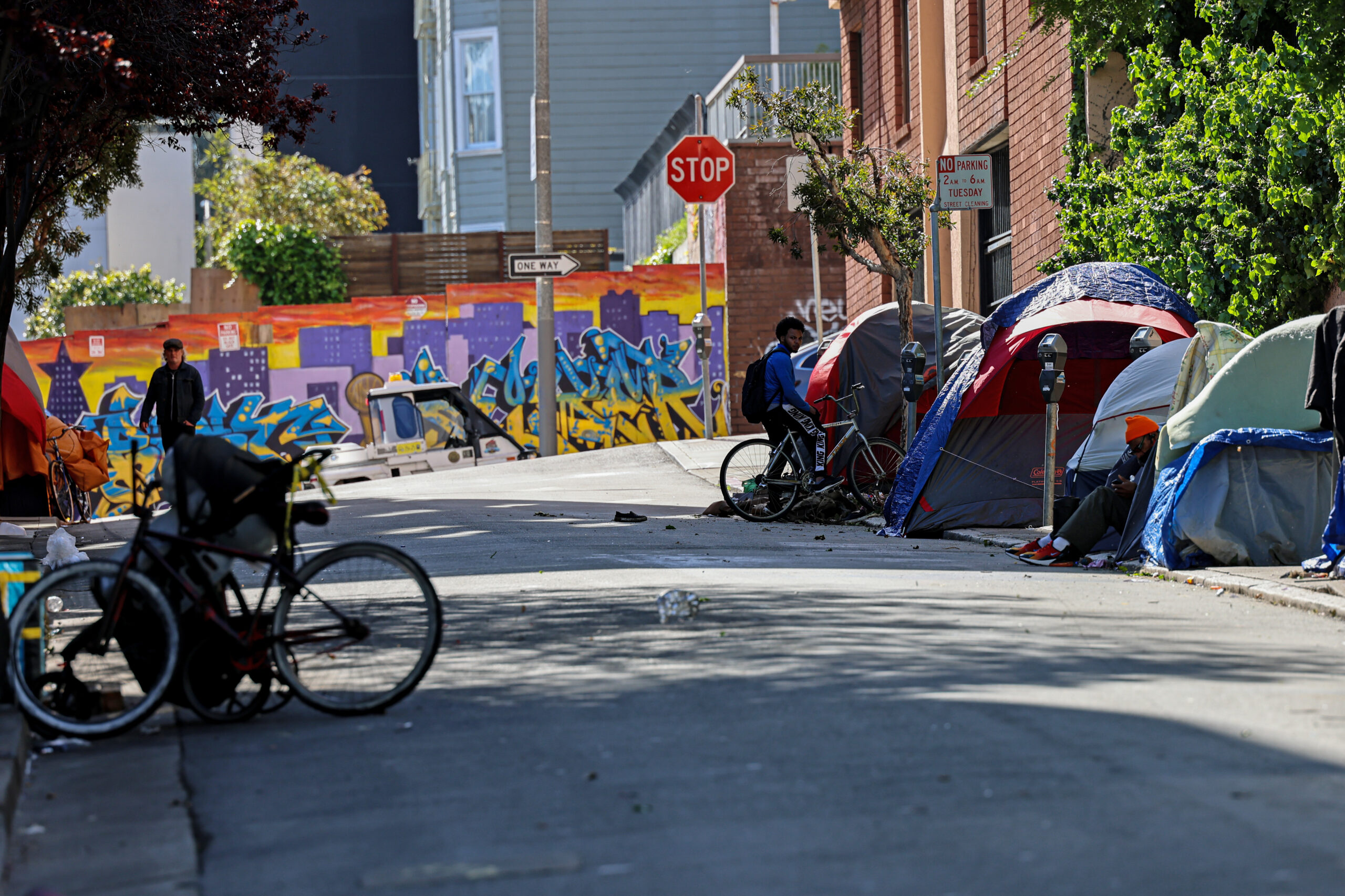Just hours after an encampment “resolution”—the city’s term for dismantling tents and asking occupants to move—a row of tents reappeared on a narrow street along Van Ness Avenue, leaving locals wondering what the point of it all was.
On March 23, city agencies responded to Larch Street between Van Ness Avenue and Franklin Street, a hotspot for encampments since the pandemic—and an ongoing source of concern for nearby residents and property managers who’ve reported fires, vandalism, drug activity and other disturbances in connection with the street conditions.
Citing street cleaning, city workers asked occupants of the alley to pack up and move at roughly 1:30 p.m. that afternoon.
The Department of Emergency Management, the lead agency for the city’s homeless outreach teams, said that city staff engaged with 12 individuals, three of whom accepted offers of shelter. Two declined shelter offers, while eight chose not to disclose personal information for access to services, the agency said.
By that evening, at least six tents again lined the sidewalks of the narrow street, along with a mattress, an outdoor stove with what appeared to be containers of fuel, and other belongings. That Sunday, the fire department responded to an outdoor fire in the alley.
“I wonder why they bother doing it,” said John Yandell, who has lived in an apartment along the alley since the 1980s. “Everybody deserves a place to live and to be able to get treatment, but what do you do about the people who aren’t interested in that?”
Legal Battle
The Department of Emergency Management said it only responds to a specific location once per business day, and also pointed to a court injunction that restricts when city workers can ask people living on the street to move.
“Unhoused people who refuse services or shelter may be asked to move temporarily for cleaning activities, but otherwise, the City must allow them to remain in place provided they are not obstructing the public right of way,” said the agency.
Last year, the Coalition on Homelessness and a group of homeless plaintiffs sued the city alleging that its encampment resolutions or “sweeps” violate federal precedent. They also accused the city of illegally destroying personal property while clearing tents; homeless plaintiffs have since filed thousands in lost property claims.
In December, an injunction issued by U.S. Magistrate Judge Donna Ryu barred the city from enforcing laws against sitting, lodging or lying in the street. Under the order, sweeps are only permitted under a narrow set of circumstances, such as street cleaning.
“Until this thing in adjudicated at a higher level, I don’t think we’re likely to see any long-term change, that’s just my view,” said Yandell.
City Attorney David Chiu has appealed the court’s injunction on the grounds that it is overly broad and untenable, saying it puts the city in an “impossible situation.” Among other issues, Chiu wrote that the court didn’t clarify what it means to be involuntarily homeless and whether that applies to individuals who don’t accept shelter.
Attorneys for the Coalition on Homelessness have countered that the facts aren’t on the city’s side, saying that individuals can’t easily access shelter of their own volition.
In interviews with The Standard, unhoused individuals have voiced varying reasons for remaining outside: Some expressed fear of being in shelters with potentially erratic strangers, or said the facilities lacked sufficient storage space. Others said they simply mistrusted the city’s outreach operations.
As part of encampment resolutions, city workers commonly ask individuals for information such as name, date of birth and questions regarding shelter accommodations.
A man living on Larch, an immigrant from Panama who gave the name Alfonso, said in a March 28 interview that he’d moved back onto the alley after the city’s crew left last Thursday. He said he wasn’t offered shelter, and had been on a housing waiting list for a year since losing his place at a shelter-in-place hotel after being arrested for an outstanding warrant.
“They just asked me to move my tent and that’s it,” Alfonso said. “I don’t know where to go, to be honest.”
